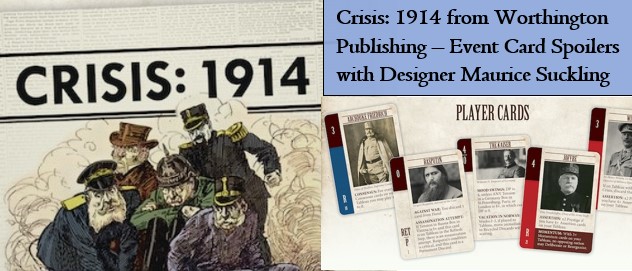We became acquainted with Maurice Suckling with his game Freeman’s Farm 1777 from Worthington Publishing in 2019 and really enjoyed the mechanics and how they all came together to create an interactive and interesting look at the Battle of Saratoga during the American Revolution. Since that time, Maurice has designed several other games that have went on to successful Kickstarter campaigns including Hidden Strike: American Revolution, Chancellorsville 1863 and 1565 Siege of Malta. He is now working on a game that is tied to the buildup of tensions that led to the outbreak of The Great War called Crisis: 1914 from Worthington Publishing, which was successfully funded on Kickstarter this past summer. He has prepared a series of Event Card Spoilers for the game and we are hosting them here on the blog. These posts will share the cards basis in history as well as how they are used in the game.
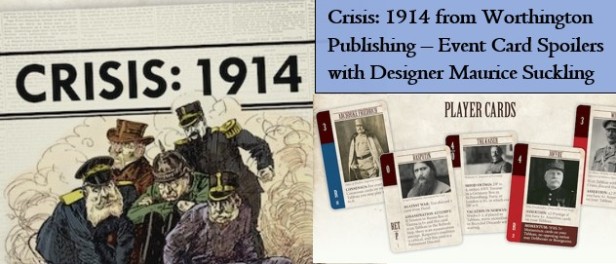
If you are interested in ordering Crisis: 1914, you can pre-order a copy for $65.00 from the Worthington Publishing website at the following link: https://www.worthingtonpublishing.com/collection/crisis-1914-pre-order-this-game-will-not-ship-until-february-2024
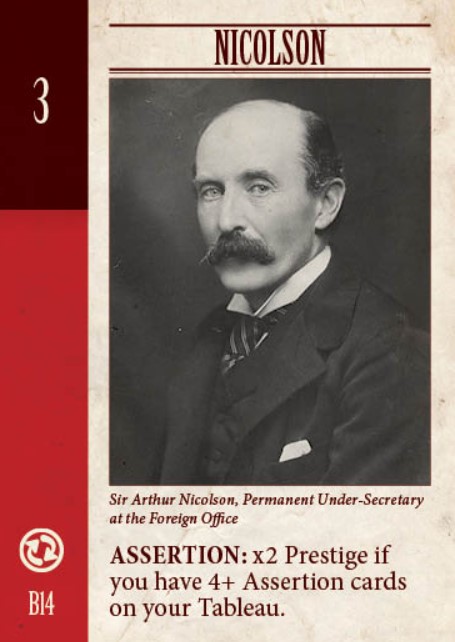
Card #14 – Sir Arthur Nicolson – Permanent Under-Secretary at the Foreign Office
Former British Ambassador to Russia whose favor still skewed toward St. Petersburg and away from Berlin (Otte 2014, 262, 298). Nicolson considered the Anglo-Russian Convention to be vital to the stability of the British Empire and, only two months prior to the Crisis, emphasized that “it is absolutely essential to us [Britain] to keep on the best terms with Russia” (Clark 2012, 324). However, he remained hopeful through much of July that the situation in the Balkans would not escalate to a widespread conflict and advocated in favor of Grey’s four-power mediation proposal in a meeting with Prince Lichnowsky on July 26th (Otte 2014, 142, 295, 300).
Despite his seemingly positive intentions, Berlin was less than thrilled. In the process of proposing this new plan, Nicolson unintentionally dismissed Germany’s concerns about Russia’s initiation of the “Period Preparatory to War” on July 25th; as far as he and Grey had heard from George Buchanan, preliminary mobilization measures were not yet in place (McMeekin 2013, 214-215). The plan also risked putting Germany at a greater disadvantage in negotiations than they had expected from previous conversations – effectively pitting them against Britain, France, and Italy in resolving the conflict between Serbia, Austria-Hungary, and Russia (McMeekin 2013, 216).
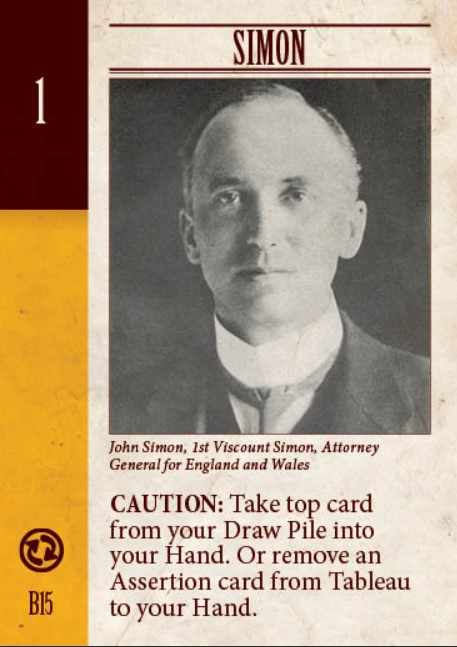
Card #15 – John Simon, 1st Viscount Simon – Attorney General for England and Wales
A member of the non-interventionist wing of the Liberal Party allied with John Burns, Lewis Harcourt, Lord Morley, and Earl Beauchamp. Although Simon initially threatened to resign on July 27th if Britain were to intervene in defense of France, he remained open to British involvement in the face of “the invasion wholesale of Belgium” as late as August 2nd (Clark 2012, 493; Martel 2014, 376). By midday on August 3rd, he had tendered his resignation; within less than a day, and with said invasion looming, he reversed course and “returned to the fold” (McMeekin 2013, 364-365; Martel 2014, 390).
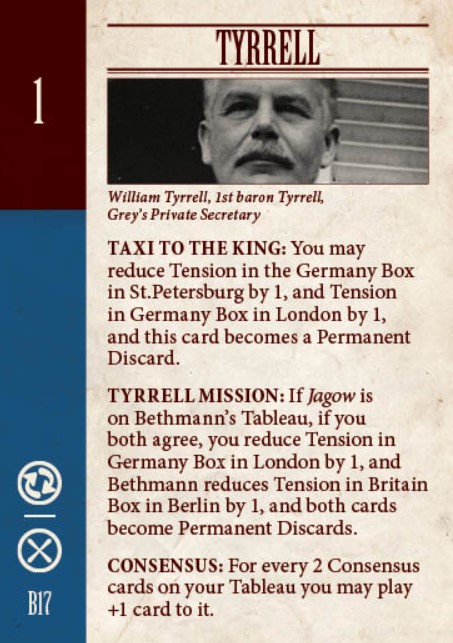
Card #17 – William Tyrrell, 1st Baron Tyrrell – Grey’s Private Secretary
One of Grey’s oldest and closest confidants. More than just a scribe, Tyrrell had become an advocate for closer ties with Germany and throughout the Crisis played an active role in mitigating the outbreak of war (Clark 2012, 202, 323; Otte 2014, 475). Perhaps his greatest effort came in the form of a planned secret mission to Germany on July 8th to meet with Gottlieb von Jagow, State Secretary at the Foreign Office; due to an illness and prolonged recovery, Tyrrell was forced to postpone his plans and ultimately never made the trip (Otte 2014, 150-153).
Still, he would continue to play the role of mediator following his return from leave. In one particularly noteworthy instance: Around 1:30am on August 1st, mere hours after the Kaiser’s declaration of Kriegsgefahrzustand, Tyrrell joined Prime Minister Asquith and Arthur Nicolson in a frantic taxi ride to Buckingham Palace “to have the king woken so that he could send a telegram appealing to the Czar [his cousin] to halt the Russian mobilization” (Clark 2012, 535; McMeekin 2013, 329-330).
Card #18 – Entente Cordiale – Secret Anglo-French Agreement
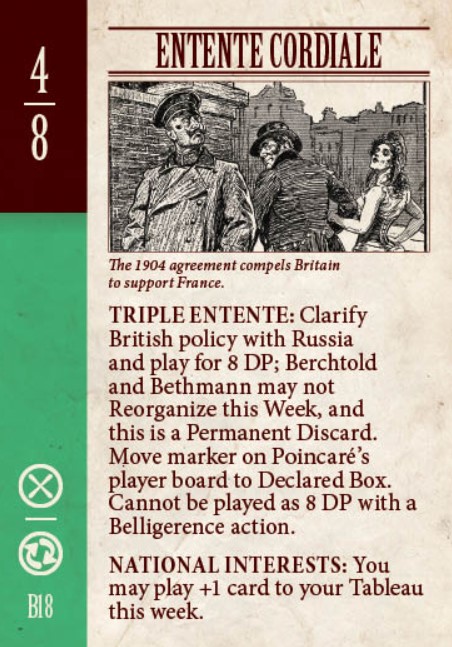
A non-binding agreement between France and Britain in 1904, largely orchestrated on behalf of the former by then-Foreign Minister Théophile Delcassé and Ambassador Paul Cambon (Clark 2012, 193-194). For Britain, the Anglo-French Entente was intended as much less of “an anti-German device” than as a means of mitigating colonial disputes with both France and Russia; one of its outcomes, for example, came in the form of mutual recognition of French control over Morocco and British control over Egypt (Clark 2012, 139, 140, 155, 538-539).
Although Grey had previously publicly denied Britain’s obligation to aid France under the Entente, mostly as an attempt to navigate domestic political waters, Christopher Clark argues that he still feared “parliament might not honor the moral obligation to France that he had worked so hard to create and protect” during the crisis; Grey’s French counterparts, on the other hand, widely expected he would come to their aid (Clark 2012, 204, 495).
In addition, Grey might have availed himself of the opportunity to clarify Britain’s position in the event of an Austrian attack on Serbia. As Buchanan told him on July 24th: “I thought you might be prepared to represent strongly at Vienna and Berlin danger to European peace of an Austrian attack on Serbia. You might perhaps point out that it would in all probability force Russia to intervene, that this would bring Germany and France into the field, and that if war became general, it would be difficult for England to remain neutral” (Ponting 2003, 115). Grey took this tack, but only on July 29th when it was too late to have had any significant sobering effect in Vienna or Berlin (Ponting 2003, 200).
If you missed the previous entries in the series, you can catch up on the posts to date by following the below links:
Series Introduction and General Mobilization Cards
If you are interested, we posted an interview with the designer and you can read that at the following link: https://theplayersaid.com/2023/07/12/interview-with-maurice-suckling-designer-of-crisis-1914-from-worthington-publishing-currently-on-kickstarter/
-Grant
